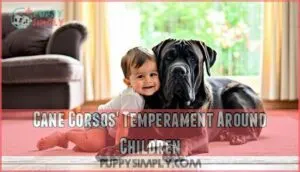This site is supported by our readers. We may earn a commission, at no cost to you, if you purchase through links.
 Cane Corsos can be wonderful family companions when properly trained and socialized, but they’re not automatically kid-friendly.
Cane Corsos can be wonderful family companions when properly trained and socialized, but they’re not automatically kid-friendly.
They’re naturally protective and loyal, which works in your favor once they bond with your children.
These gentle giants weigh up to 120 pounds, so their sheer size means you’ll need constant supervision around babies and toddlers.
However, without early socialization and consistent training, they might be too intense for little ones.
Think of them as loving guardians who need guidance to understand their role in your family dynamic.
The key lies in starting young, setting clear boundaries, and understanding which age groups work best with these magnificent dogs.
Table Of Contents
- Key Takeaways
- Are Cane Corsos Good With Babies?
- Are Cane Corsos Good With Older Kids?
- Cane Corsos’ Temperament Around Children
- How to Train Cane Corsos as Family Dogs?
- Cane Corsos and Infants
- Cane Corso Puppies and Children
- Setting Up Boundaries
- Frequently Asked Questions (FAQs)
- Do Cane Corsos make good family dogs?
- Will Cane Corsos turn on their owners?
- Are Cane Corsos considered aggressive?
- Are Cane Corsos protective of children?
- How much exercise does a Cane Corso need?
- How can I tell if my Cane Corso is feeling anxious or stressed?
- What is the best way to introduce a Cane Corso to a baby?
- How can I tell if my Cane Corso is getting enough socialization?
- What should I do if my Cane Corso is exhibiting aggressive behavior?
- Do Cane Corsos drool around children excessively?
- Conclusion
Key Takeaways
- You’ll need constant supervision – Cane Corsos can weigh up to 120 pounds, making their size a safety concern around babies and toddlers, even when they are gentle and well-intentioned.
- Early socialization is non-negotiable – You must expose your Cane Corso to children during the critical 8-16 week puppy period to develop appropriate responses and prevent future behavioral issues.
- Older kids work better than toddlers – You’ll find that Cane Corsos bond more successfully with school-age children (6+) who can understand boundaries and communicate effectively with the dog.
- Training works both ways – You need to teach your Cane Corso proper family behavior while simultaneously educating your children about respectful interactions, body language, and safety boundaries.
Are Cane Corsos Good With Babies?
Cane Corsos can be wonderful with babies, but infant safety requires constant supervision and early introduction. These gentle giants naturally protect their family, yet their size means they could accidentally harm a baby.
With proper training and supervision, these protective giants become devoted family guardians who adore their little humans.
You’ll need to establish breed compatibility through careful risk mitigation from day one. Are Corsos good with children? Absolutely, when properly managed.
Start socializing your Cane Corso with babies early, always maintain Corso supervision during interactions, and never leave them alone together. With patience and proper training, your Cane Corso and children can develop a beautiful, protective bond.
Families should also prioritize puppy temperament assessment when selecting a Cane Corso.
Are Cane Corsos Good With Older Kids?
When your child reaches school age, you’ll find that Cane Corsos develop much stronger bonds with older kids who can understand boundaries and respect the dog’s space.
These gentle giants typically show remarkable patience with children aged six and up, as both the dog and child can communicate more effectively and build mutual trust through shared activities.
They can develop this strong bond because the dog and child can communicate more effectively and build mutual trust through shared activities.
Cane Corsos and Toddlers
Toddlers and Cane Corsos don’t make the ideal pair, but it’s not impossible with the right approach. The sheer size difference creates inherent risks – a 110-pound dog can easily knock over a curious two-year-old without meaning any harm.
Your supervision becomes absolutely critical during every interaction.
Here are three key concerns every parent should understand:
- Accidental injuries happen fast – One playful nudge or excited jump can send a toddler tumbling
- Energy levels clash dramatically – Toddlers’ unpredictable movements can trigger your dog’s protective instincts
- Bite risk increases without proper socialization – Even gentle corrections from such a powerful breed can cause serious harm
Safe play requires constant vigilance and structured interactions. Teaching your toddler appropriate dog behavior around children while establishing clear boundaries helps prevent dangerous situations.
The cane corso’s protective nature means they’ll react to perceived threats to child safety, making consistent training essential for managing their interaction styles with your little one.
Given their size, prospective owners should be aware of potential hip dysplasia, a common health issue in the breed.
Cane Corsos and Older Kids
While toddlers face significant safety challenges with these powerful dogs, older children tell a completely different story with Cane Corsos.
Kids aged eight and above make ideal teenage companions for these gentle giants. The American Kennel Club rates Cane Corsos 3/5 for interactions with young children, but this score jumps dramatically with mature kids who understand proper dog behavior around children.
Your cane corso thrives when kids treat them as activity partners rather than living toys. These intelligent dogs excel at reading situations and respond beautifully to respectful interactions. Older children can handle shared responsibilities like feeding schedules and basic training commands, creating meaningful bonds.
Think of your Cane Corso as canine mentors – they teach responsibility while providing unwavering loyalty. However, success depends entirely on early socialization and consistent training. Your family dog needs exposure to various children during puppyhood to develop appropriate responses.
With proper preparation, these majestic dogs transform from potential risks into protective guardians who’ll watch over your older children like devoted siblings.
Cane Corsos’ Temperament Around Children
Understanding your cane corso temperament around children starts with recognizing their naturally calm, protective nature.
**Cane Corsos possess an intuitive gentleness with children, but their massive size demands respect and constant supervision.
These gentle giants possess lower excitability than most guard dogs, making them surprisingly kid friendly when properly socialized. Their protective instincts create natural guardians, but temperament factors like early training impact how they interact with little ones.
Key traits that make cane corso with kids successful:
- Calm demeanor – Higher tolerance threshold prevents overreactions to children’s energy
- Affectionate loyalty – Deep family bonds encourage gentle behavior around household members
- Intuitive sensing – Natural ability to read situations and respond appropriately to children’s needs
- Patient nature – Remarkable tolerance for typical childhood behaviors when corso supervision maintains boundaries
Breed aggression isn’t inherent but develops without proper socialization, making dog and child safety dependent on consistent training from puppyhood.
How to Train Cane Corsos as Family Dogs?
Training your Cane Corso as a family dog requires dedication and smart strategies.
These gentle giants need structure from day one to become the loving companions you want around your children.
Key training fundamentals include:
- Early Obedience: Start crate training and basic commands at 8 weeks old
- Socialization Methods: Expose your puppy to various people, children, and environments frequently
- Positive Reinforcement: Reward good behavior instead of harsh corrections to build trust
Proper Cane Corso training and socialization create the foundation for safe dog and child safety interactions.
Their protective nature means that early socialization is key to a well-adjusted temperament.
Cane Corsos and Infants
Your Cane Corso’s protective instincts shine brightest around infants, but their impressive size demands careful attention.
These gentle giants typically adore babies, yet supervision needs remain non-negotiable due to their 100+ pound frame.
Watch for jealousy signs when introducing your newborn – some Corsos might seek extra attention or display attention-seeking behaviors.
Gradual introduction works best for family harmony.
While your Cane Corso will likely become your infant’s devoted guardian, never leave them unsupervised together, as infant safety always comes first, regardless of your dog’s loving intentions toward kids, and requires constant supervision.
Cane Corso Puppies and Children
When bringing home your Cane Corso puppy, you’re starting with a clean slate for building positive child-dog interactions.
Early socialization during the critical 8-16 week period shapes your puppy’s temperament around kids forever.
Focus on bite inhibition training immediately – puppies naturally mouth everything, but teaching gentle play prevents future problems.
Arrange safe playdates where children learn proper handling techniques while your corso puppy discovers appropriate boundaries.
Consistent puppy training during these formative months creates the foundation for lifelong harmony between your growing dog and children.
Setting Up Boundaries
Since your Cane Corso puppy needs clear expectations to thrive with kids, establishing firm boundaries becomes your family’s foundation for success.
You’ll want to create safe spaces where both your dog and children can retreat when they need downtime. Designate specific areas as "no-go zones" for roughhousing, and establish consistent rules that everyone follows.
Teach your kids about respectful interactions—no tail pulling, ear tugging, or surprise hugs that might startle your pup. Supervised playtime should always include gentle touches and calm voices.
Your child education efforts pay off when little ones learn to read your dog’s body language and respect warning signals. A good start to this is understanding essential training equipment.
Remember, dog training works both ways. While you’re teaching your Cane Corso proper family behavior, you’re also training your children to be responsible pet owners. This dual approach to dog socialization creates lasting bonds built on mutual respect and understanding.
Frequently Asked Questions (FAQs)
Do Cane Corsos make good family dogs?
Looking for a gentle giant? You’ll find Cane Corsos make devoted family companions when properly trained and socialized.
They’re naturally protective yet affectionate, but need experienced owners who can provide consistent leadership and boundaries, making them a great choice for those who can offer consistent care.
Will Cane Corsos turn on their owners?
Properly trained and socialized Cane Corsos won’t turn on their owners.
However, neglected training, harsh treatment, or inexperienced handling can trigger aggressive behavior.
You’ll need consistent leadership and early socialization to prevent problems.
Are Cane Corsos considered aggressive?
Cane Corsos aren’t inherently aggressive, but they’re naturally protective and dominant.
Without proper training and socialization, they can become problematic.
You’ll need experience handling large breeds to manage their guarding instincts effectively.
Are Cane Corsos protective of children?
Fiercely faithful guardians, Cane Corsos naturally protect children they consider family members.
You’ll find they’re incredibly devoted to kids once properly socialized, though their protective instincts require careful management and supervision, making them incredibly devoted.
How much exercise does a Cane Corso need?
Your Cane Corso needs at least 60-90 minutes of daily exercise, combining walks, playtime, and mental challenges.
Their energy levels make activities like agility or obedience training a great way to keep them healthy and happy.
How can I tell if my Cane Corso is feeling anxious or stressed?
Watch for panting, pacing, drooling, or trembling when there’s no obvious cause.
Your Corso might also whine, hide, refuse food, or show destructive behavior.
Pay attention to body language changes—they’re telling you something’s wrong.
What is the best way to introduce a Cane Corso to a baby?
Start by letting your Cane Corso sniff baby items like blankets or clothes before arrival.
Supervise all interactions closely, maintain your dog’s routine, and never leave them alone together until trust is completely established, following a strict routine to ensure complete safety.
How can I tell if my Cane Corso is getting enough socialization?
Your Cane Corso shows good socialization through calm behavior around strangers, children, and other dogs.
Look for relaxed body language, willingness to approach new situations, and controlled reactions to unfamiliar sounds or environments, which indicate good socialization.
What should I do if my Cane Corso is exhibiting aggressive behavior?
Like a storm cloud gathering, aggressive behavior needs immediate attention.
Stop the behavior, remove triggers, and consult a professional trainer or veterinary behaviorist.
Don’t delay—early intervention prevents escalation and keeps everyone safe, which is crucial for everyone’s safety.
Do Cane Corsos drool around children excessively?
Cane Corsos naturally drool more than many breeds, but it’s not typically excessive around children specifically.
You’ll notice moderate drooling throughout the day, especially after drinking water or during excitement, regardless of who’s present.
Conclusion
Imagine this scenario: you’re watching your Cane Corso gently interact with your child, and you realize the months of training paid off.
Are Cane Corsos good with kids? They absolutely can be, but success isn’t automatic.
These powerful dogs need early socialization, consistent boundaries, and constant supervision around young children.
With proper preparation and commitment, you’ll discover that Cane Corsos make devoted family guardians who’ll protect your kids while respecting the household rules you’ve established together.
- https://www.akc.org/dog-breeds/cane-corso/
- https://www.thesprucepets.com/tips-for-childproofing-a-dog-1117491
- https://www.doggonesafe.com/baby_safety_around_dogs
- https://www.aspca.org/pet-care/dog-care/common-dog-behavior-issues/mounting-and-masturbation
- https://www.pdsa.org.uk/pet-help-and-advice/looking-after-your-pet/puppies-dogs/large-dogs/cane-corso










